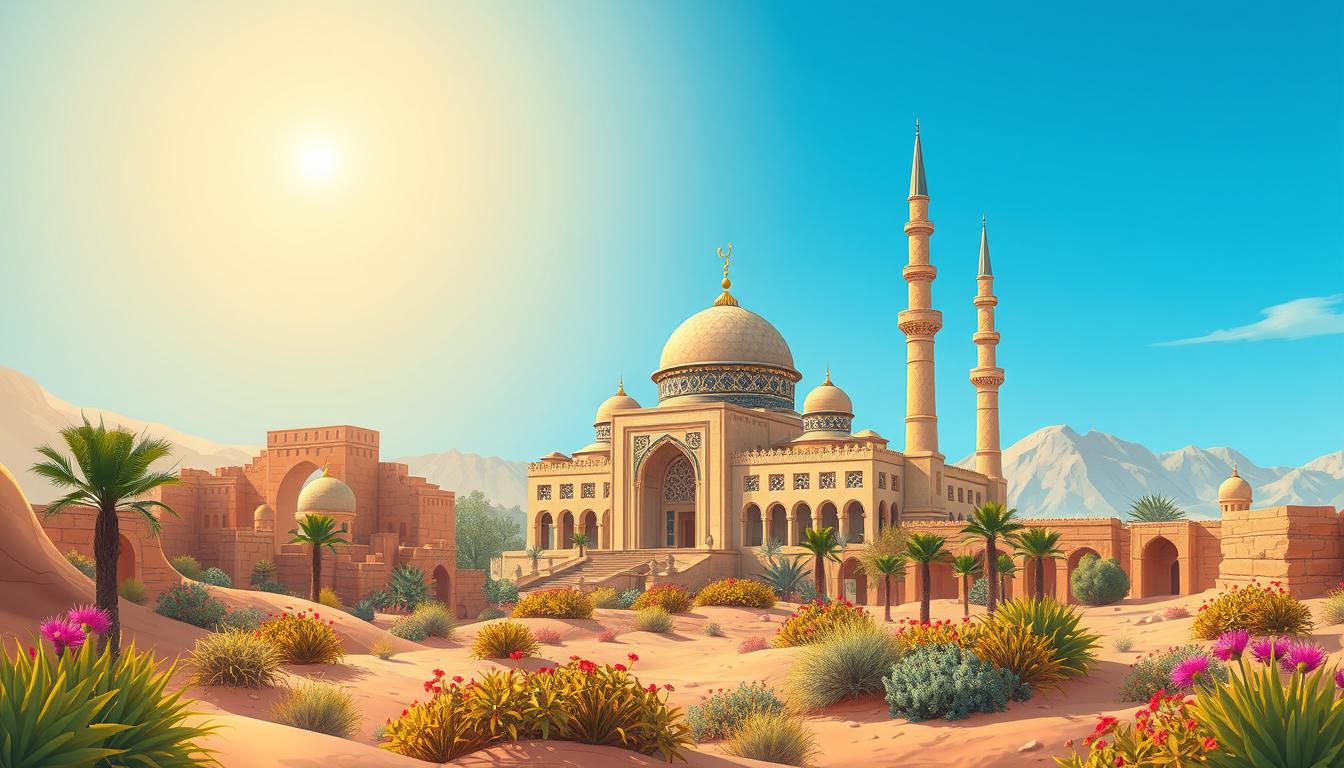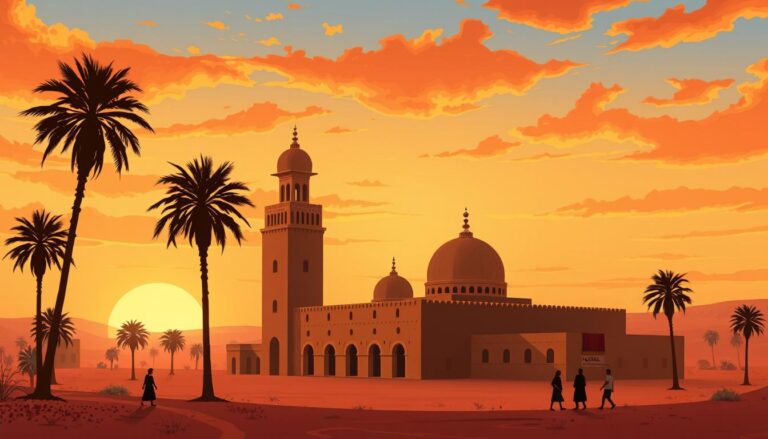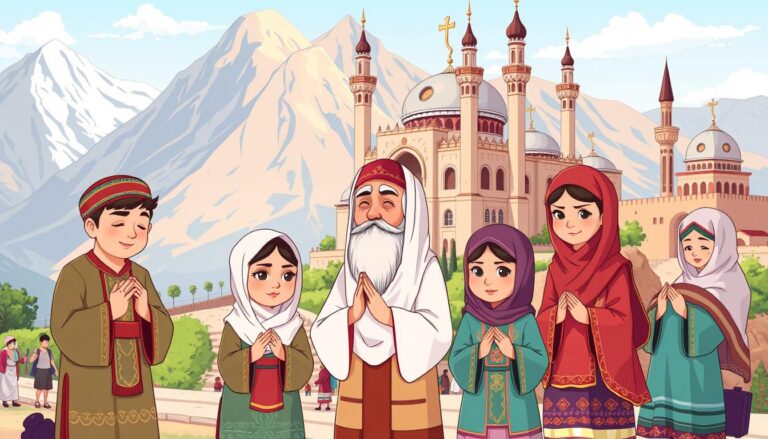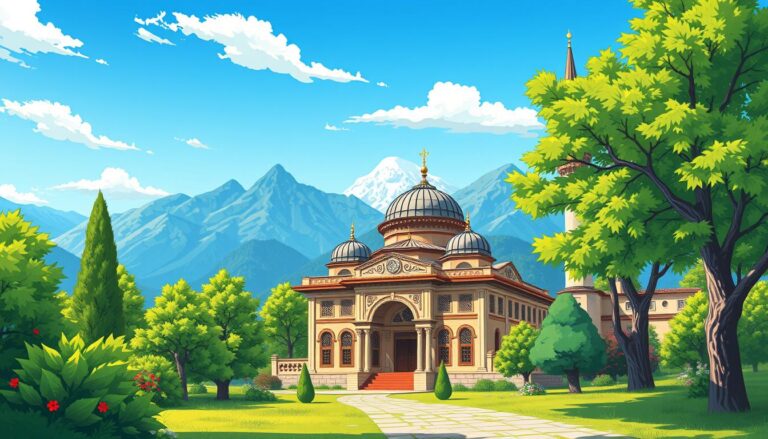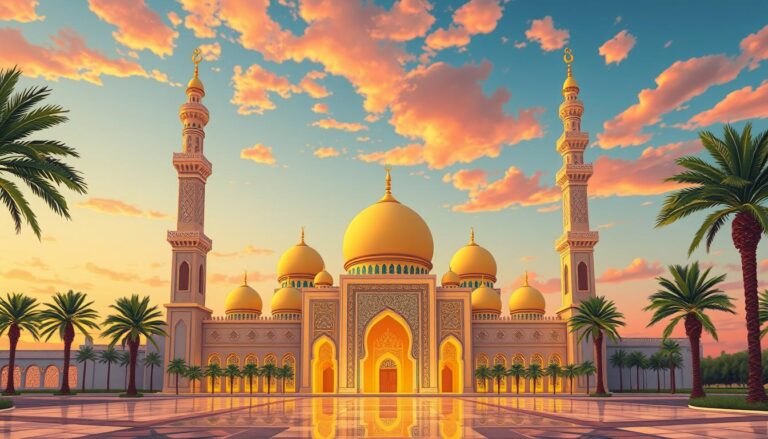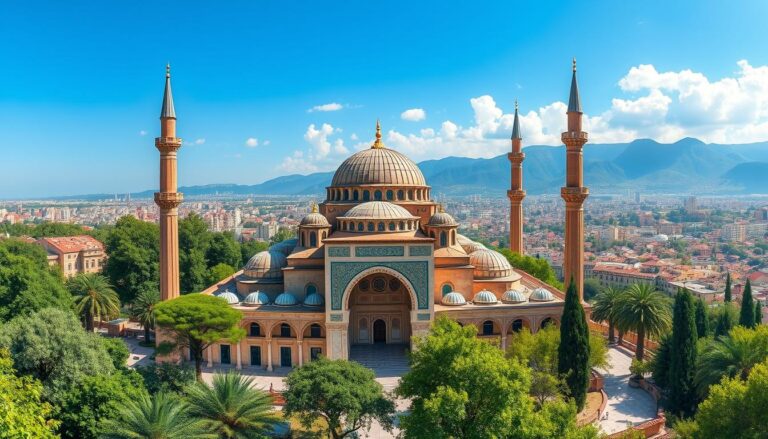Islam in Jordan
The Hashemite Kingdom of Jordan is mostly Muslim, with 96% of people following Sunni Islam. The royal family is Sunni, and a small group follows Shiite Islam. There are also about 20,000 to 32,000 Druze living in the north.
Jordan’s Islamic roots deeply influence its culture and society. Islam shapes daily life, with the lunar calendar marking key events like Ramadan. Halal eating and the importance of marriage show Islam’s role in Jordanian life.
Introduction to Islam in Jordan
Jordan has a rich Islamic heritage that has shaped its history and culture. Most Jordanians follow Sunni Islam, the main branch of Islam in the area. Yet, Jordan is also home to various religious minorities living in peace with the Muslim majority.
Jordan’s Islamic Heritage and Sunni Majority
The Islamic conquest of Bilad al-Sham, which includes today’s Jordan, happened in stages from 633 AD to 648 AD. Key battles like the Battle of Fahl in 635 AD and the Battle of Yarmuk in 636 or 637 AD were crucial. After the conquest, the Near East was split into five military areas, with North-East Jordan under ‘Urdunn and the rest of Jordan in Damascus.
The Umayyad dynasty, with its capital in Damascus since 661 AD, found many Jordanians still Christian. Yet, some tribes did convert to Islam. This era also saw the building of “desert castles” in Jordan, used for politics, economy, and culture.
Coexistence with Other Religions in Jordan
Islam is Jordan’s state religion, but the 1952 Constitution also protects religious freedom. Christians, making up about 1% of the population, and fewer followers of other faiths like the Druze live there. Despite strong Islamic ties, Muslims and other religious groups generally live in peace.
“Jordan was connected by major roads linking Damascus to Amman and Aqaba, facilitating travel and trade, as well as serving for pilgrimage routes to Mecca.”
The Islamic impact on Jordan is clear, yet the country’s religious diversity shows its dedication to tolerance and understanding.
Demographic Composition of Muslims in Jordan
In Jordan, most people, about 95%, are Sunni Muslims. Shia Muslims and other religious groups like Bahais and Druze make up 2% of the population. There are no big groups of religious minorities in any area. But, cities like Husn, Fuheis, Madaba, and Karak have big Christian communities. The northern part of Azraq is home to a large Druze population.
Percentage of Sunni and Shia Muslims
About 95% of Jordan’s people are Sunni Muslims. Shia Muslims, Bahais, and Druze make up the other 2%. Most Muslims in Jordan follow Sunni Islam, which has a long history in the area.
Regional Distribution of Muslims in Jordan
While most Muslims in Jordan are Sunni, the country is religiously diverse. Cities like Husn, Fuheis, Madaba, and Karak have big Christian populations. The northern part of Azraq has a large Druze community. Muslims are spread out all over Jordan, with no big groups of religious minorities.
“Jordan’s Islamic population is predominantly Sunni Muslim, comprising an estimated 95% of the country’s total population.”
Role of Islam in Jordanian Society
Islam is very important in Jordanian society. The country’s laws say Islam is the main religion. The king must also be a Muslim.
The government uses Islamic law for personal matters like marriage and inheritance. This shows how big of a role Islam plays.
About 98% of Jordan’s 6.3 million people are Muslim. This makes Islam the main religion in the country. Most, around 95%, are Sunni Muslims. Shia Muslims, Bahais, and Druze make up about 2% of the population.
Islam as the State Religion
Jordan’s laws say Islam is the state religion. This greatly affects the country’s culture, laws, and society. Islamic values guide the government’s decisions.
“During the holy month of Ramadan, all restaurants are closed from sunrise to sunset, highlighting the observance of fasting and religious practices.”
Islamic practices are a big part of Jordanian life. For example, a 200% tax on alcohol affects everyone. This shows how strong Islam’s influence is in Jordanian society.
But, there’s a lot of variation in how Muslims follow their faith in Jordan. Families differ in fasting during Ramadan, wearing hijab, and other practices. This shows the diversity within the Muslim community in Jordan.
Islam in Jordan
Before the 1980s, Jordan’s people had varied religious practices. These practices often clashed with true Islam, influenced by old customs. But, the 1980s brought a big Islamic revival. This was marked by more people following Islamic practices and beliefs openly.
Islamic Practices and Observances
In the 1980s, more Jordanians started following Islamic practices. Women began wearing Islamic dress like headscarves. They also joined men in daily activities, ending their seclusion.
Going to Friday prayers and keeping the fast of Ramadan became more common. This was a big change in the country’s religious life.
Islamic Revival in the 1980s
The Islamic revival in Jordan in the 1980s had many reasons. The rise of Islamism in the Middle East was one. People were looking for answers to economic problems and the failure of nationalist politics.
This led to a deeper interest in Islam in everyday life. It was a significant change in Jordan’s religious scene.
“The 1980s witnessed a stronger and more visible adherence to Islamic customs and beliefs, with increased observance of practices such as wearing conservative Islamic dress, attending Friday prayers, and fasting during Ramadan.”
Legal Framework for Religious Freedom
Jordan’s constitution protects the right to practice one’s religion. Yet, Islam is the state religion, and the king must be Muslim. This makes the complex.
Constitutional Provisions
The Jordanian constitution ensures the . It says Islam is the state religion and Islamic Shariah is a key law source. This means Sharia law is important for Muslims’ personal matters.
Restrictions on Conversion from Islam
Changing from Islam is not allowed by Islamic law. might lose their civil rights. The government bans converting from Islam, seeing it as against Sharia.
“The state religion is Islam, and the Islamic Shariah shall be a principal source of legislation.”
Even with these rules, Jordan is generally open to religious minorities. They can freely practice their faiths. But, converting from Islam is still restricted, showing Jordan’s commitment to Islamic values.
Religious Minorities in Jordan
Most people in Jordan are Muslim, but the country also has a significant Christian community. This group makes up about 2.2% to 6% of the population. Jordan is known for its respect towards religious minorities, including Christians.
The Christian community in Jordan is diverse, with different denominations like Greek Orthodox, Roman Catholic, and Protestant. These groups mainly live in cities like Husn, Fuheis, Madaba, and Karak. These places show the rich diversity in Jordan.
Christian Communities in Jordan
Jordan’s Christian population has a rich history, dating back to the early days of Christianity. Despite being a minority, they can worship freely. However, they must avoid public preaching or outreach to Muslims.
- The monarchy of King Abdullah II has recognized multiple churches in Jordan, allowing these communities to practice their faith without hindrance.
- However, Christians who are active in evangelism, support converts from Islam, belong to unrecognized churches, or are converts from Islam face social pressure and discrimination.
- Converts from Islam are the most vulnerable group, often facing threats of violence, loss of official documents, and even the risk of being killed if their conversion becomes known.
Despite challenges, Jordan has kept its religious landscape stable. However, religious minorities still face issues, especially in conservative and rural areas. The country’s commitment to diversity and protecting religious minorities is vital to its social fabric.
Challenges and Issues
Relations between Muslims and Christians in Jordan are mostly peaceful. But, those who follow unrecognized religions or convert to other faiths face big challenges. They might face mental and physical abuse from their families, government officials, and community members.
Converting from Islam is not legally allowed in Jordan. This means converts could lose their civil rights.
Discrimination and Societal Pressures
Jordan is mostly Sunni Muslim, with over 90% of the population. It has a history of religious discrimination against minority groups. Religious discrimination in Jordan and societal pressures on minorities in Jordan are big problems.
Apostasy, or leaving one’s faith, is a crime in Jordan. Those who convert from Islam face harsh penalties. They could lose their civil rights and be shunned by society.
“In Jordan, the dominance of religion in public life undermines the right to equality and non-discrimination. Systemic religious privilege results in significant social discrimination against minority groups.”
The lack of legal protections and the need to follow the majority faith make life hard for religious minorities. This has led to their marginalization and the suppression of their freedom of religion and expression.
To tackle these issues and protect religious freedoms in Jordan, a wide-ranging approach is needed. This includes legal changes, education, and changing societal views towards diversity and inclusivity.
Government Policies and Initiatives
The Jordanian government puts Islam and Sharia law first. It watches some citizens and foreign groups who might try to change Muslims’ beliefs. It also lets 11 Christian denominations be recognized, but others face legal issues.
To keep things under control, the government checks on Christian churches and leaders. This is for security, but it’s not too invasive.
Recognition of Religious Groups
The government in Jordan officially backs 11 Christian groups. They get legal rights and some freedoms. But, groups like Baha’is and Jehovah’s Witnesses don’t get the same respect. They face legal problems and lack protection.
Monitoring and Security Measures
- The government keeps an eye on Christian churches and leaders for security. This is mostly not too invasive.
- It watches groups that might try to change Muslims’ beliefs. Changing from Islam is not allowed in Jordan.
- The government also limits the Muslim Brotherhood’s power. It has taken their assets and supports other religious voices.
The Jordanian government wants to keep things stable and controlled. It recognizes the country’s religious diversity to some degree. But, its policies also mean some groups face limits on their freedom.
Conclusion
Jordan’s bond with Islam is strong, with Sunni Islam leading the way. It plays a big role in the country’s society, culture, and government. Yet, challenges exist, especially around converting from Islam and treating all religious groups fairly.
The threat of terrorism has grown, affecting how the government views Islamist groups. This has led to a more cautious stance. The Muslim Brotherhood’s experiences in other countries have also influenced Jordan’s policies, especially towards the Islamic Action Front (IAF).
Despite these issues, Islam is a key part of Jordan’s identity. Finding a balance between security and religious freedom is vital. This balance will help keep Jordan stable and united.
Source Links
- Islam in Jordan
- Religion in Jordan
- ▷ Islam: Jordan’s Religion | Jordania Exclusiva
- Strategiecs Think Tank – The Muslim Brotherhood in Jordan: Regional Role and Transnational Ideology
- The Rise of Islam and the Conquest of Bilad al-Sham
- Jordan – United States Department of State
- National Profiles | World Religion
- Maura Welch on Islam’s Role in Daily Life in Jordan
- Tiny Jordan’s outsize role fostering interfaith understanding
- Jordan – United States Department of State
- JORDAN 2021 INTERNATIONAL RELIGIOUS FREEDOM REPORT
- Jordan – United States Department of State
- Jordan – Minority Rights Group
- Jordan
- Jordan – Freedom of Thought Report
- World Report 2024: Rights Trends in Jordan
- Counterterrorism and Youth Radicalization in Jordan: Social and Political Dimensions – Combating Terrorism Center at West Point
- How the Jordanian Government is Shaping the Country’s Muslim Brotherhood
- Separating Islam from Politics but Not the State: Implications for Religious Authority in Jordan
- The Jordanian Muslim brotherhood movement: from pillar of monarchy to enemy of the state | Foundation for Strategic Research
- The Jordanian Muslim Brotherhood: Exceptional or Common After All?

